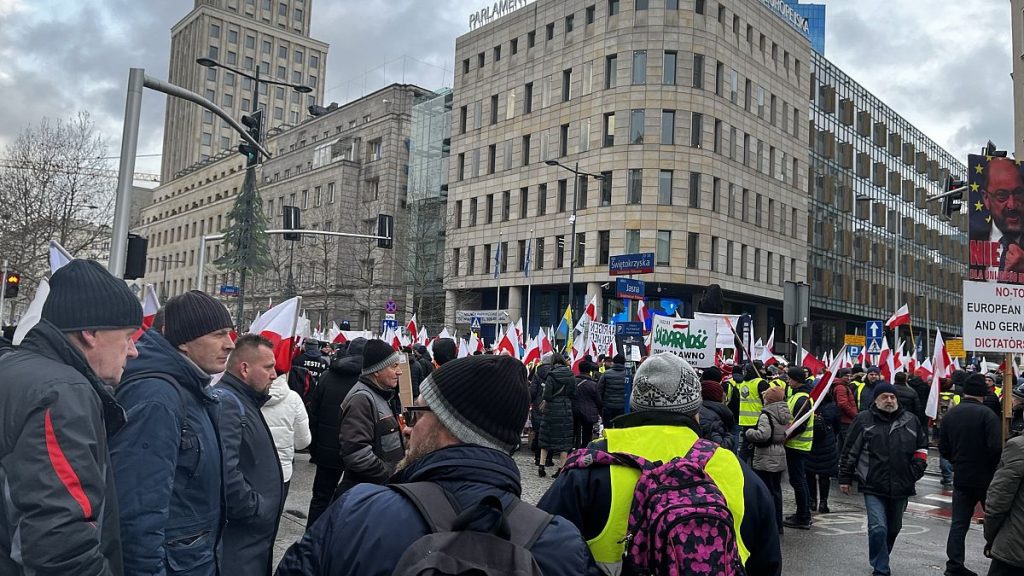The Polish countryside roared its discontent on the eve of a celebratory occasion. As Poland prepared to assume the Presidency of the Council of the European Union, marked by an inaugural gala in Warsaw, Polish farmers orchestrated a large-scale protest in the capital, casting a shadow over the festivities. Their grievances stemmed from a confluence of EU policies that they believed were detrimental to the Polish agricultural sector, encapsulating their concerns under the banner of “5 x STOP.” This slogan represented five key areas where they perceived Brussels’ influence as negative: the Mercosur trade deal, the European Green Deal, agricultural imports from Ukraine, the perceived destruction of Polish forestry and fishing, and broader economic challenges within Poland. This demonstration wasn’t an isolated incident but rather the latest wave in a tide of agricultural unrest that had swept across Europe since December 2023, with similar protests erupting in France and Spain.
The “5 x STOP” campaign crystallized the farmers’ multifaceted anxieties. The Mercosur trade agreement, a proposed pact between the EU and South American nations, was a particularly contentious issue. Polish farmers, echoing the sentiments of their counterparts in France and Spain, feared that this deal would flood the European market with cheaper agricultural products produced under less stringent environmental and labor regulations. They argued that this influx would unfairly undercut European farmers, potentially jeopardizing their livelihoods and undermining the sustainability of local agriculture. The European Green Deal, while aimed at promoting environmental sustainability, was also a source of concern. Farmers worried that the stringent regulations associated with the Green Deal would impose excessive burdens and costs, making it difficult for them to compete and potentially leading to the decline of smaller farms.
The influx of agricultural products from Ukraine further exacerbated these anxieties. Polish farmers felt that Ukrainian imports, often produced at lower costs, were creating an uneven playing field, putting them at a competitive disadvantage and depressing prices for their own products. This concern resonated with broader anxieties about economic stability within Poland and the perceived threat to the traditional livelihoods associated with farming and rural communities. The “destruction” of the Polish forestry and fishing sectors, as articulated by the protesters, added another layer to their grievances. They felt that EU policies were not adequately protecting these vital industries, potentially leading to job losses and environmental degradation.
The protests, culminating in front of Warsaw’s National Theatre where the EU presidency gala was being held, represented a direct challenge to the celebratory atmosphere. The choice of location served as a symbolic act, bringing the farmers’ concerns directly to the doorstep of the event meant to mark Poland’s leadership within the EU. This act of defiance underscored the deep-seated frustration and anxiety felt within the agricultural community. The farmers’ methods, which in prior weeks had included road blockades, border crossing closures, and picketing of government buildings, demonstrated their willingness to escalate their actions to gain attention and exert pressure on policymakers. The blockade of a border crossing with Ukraine in November and subsequent road blockades across Poland signaled the growing intensity of the protests.
The Polish government, while hosting the EU Presidency gala, found itself caught in a complex political landscape. It publicly shared the farmers’ concerns regarding the Mercosur deal, mirroring the stance taken by France and Germany. This alignment with the farmers on this specific issue highlighted the delicate balancing act the Polish government had to perform: representing Poland’s interests on the European stage while simultaneously addressing the pressing concerns of its own agricultural sector. The government’s opposition to the Mercosur deal potentially offered common ground with the protestors, but the deeper anxieties surrounding the Green Deal, Ukrainian imports, and the perceived decline of the forestry and fishing sectors remained critical points of contention.
The farmers’ protests on the eve of the EU presidency gala served as a stark reminder of the complex challenges facing European agriculture. The “5 x STOP” campaign encapsulates a broader unease within the farming community about the impacts of globalization, environmental regulations, and economic pressures. These concerns, resonating across multiple European countries, underscored the need for a deeper dialogue between policymakers, farmers, and the wider public to address the future of agriculture in a sustainable and equitable manner. The protests injected a note of discord into Poland’s assumption of the EU Presidency, forcing a confrontation between the celebratory narrative of European unity and the urgent realities of a sector struggling to adapt to a rapidly changing world. The farmers’ actions highlighted the importance of balancing international agreements and broader policy objectives with the needs and concerns of local communities and vital economic sectors like agriculture.














